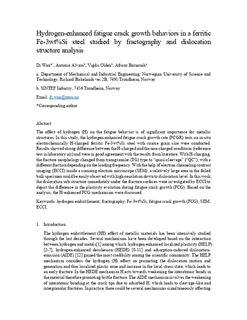| dc.contributor.author | Wan, Di | |
| dc.contributor.author | Alvaro, Antonio | |
| dc.contributor.author | Olden, Vigdis | |
| dc.contributor.author | Barnoush, Afrooz | |
| dc.date.accessioned | 2019-04-24T14:32:23Z | |
| dc.date.available | 2019-04-24T14:32:23Z | |
| dc.date.created | 2019-01-06T21:53:19Z | |
| dc.date.issued | 2019 | |
| dc.identifier.citation | International journal of hydrogen energy. 2019, 44 (10), 5030-5042. | nb_NO |
| dc.identifier.issn | 0360-3199 | |
| dc.identifier.uri | http://hdl.handle.net/11250/2595316 | |
| dc.description.abstract | The effect of hydrogen (H) on the fatigue behavior is of significant importance for metallic structures. In this study, the hydrogen-enhanced fatigue crack growth rate (FCGR) tests on in-situ electrochemically H-charged ferritic Fe-3wt%Si steel with coarse grain size were conducted. Results showed strong difference between the H-charged and the non-charged conditions (reference test in laboratory air) and were in good agreement with the results from literature. With H-charging, the fracture morphology changed from transgranular (TG) type to “quasi-cleavage” (“QC”), with a different fraction depending on the loading frequency. With the help of electron channeling contrast imaging (ECCI) inside a scanning electron microscope (SEM), a relatively large area in the failed bulk specimen could be easily observed with high-resolution down to dislocation level. In this work, the dislocation sub-structure immediately under the fracture surfaces were investigated by ECCI to depict the difference in the plasticity evolution during fatigue crack growth (FCG). Based on the analysis, the H-enhanced FCG mechanisms were discussed. | nb_NO |
| dc.language.iso | eng | nb_NO |
| dc.publisher | Elsevier | nb_NO |
| dc.rights | Attribution-NonCommercial-NoDerivatives 4.0 Internasjonal | * |
| dc.rights.uri | http://creativecommons.org/licenses/by-nc-nd/4.0/deed.no | * |
| dc.title | Hydrogen-enhanced fatigue crack growth behaviors in a ferritic Fe-3wt%Si steel studied by fractography and dislocation structure analysis | nb_NO |
| dc.type | Journal article | nb_NO |
| dc.type | Peer reviewed | nb_NO |
| dc.description.version | acceptedVersion | nb_NO |
| dc.source.pagenumber | 5030-5042 | nb_NO |
| dc.source.volume | 44 | nb_NO |
| dc.source.journal | International journal of hydrogen energy | nb_NO |
| dc.source.issue | 10 | nb_NO |
| dc.identifier.doi | 10.1016/j.ijhydene.2018.12.190 | |
| dc.identifier.cristin | 1651133 | |
| dc.relation.project | Norges forskningsråd: 521672 | nb_NO |
| dc.relation.project | Norges forskningsråd: 244068/E30 | nb_NO |
| dc.description.localcode | © 2019. This is the authors’ accepted and refereed manuscript to the article. Locked until 18.1.2021 due to copyright restrictions. This manuscript version is made available under the CC-BY-NC-ND 4.0 license http://creativecommons.org/licenses/by-nc-nd/4.0/ | nb_NO |
| cristin.unitcode | 194,64,92,0 | |
| cristin.unitname | Institutt for maskinteknikk og produksjon | |
| cristin.ispublished | true | |
| cristin.fulltext | preprint | |
| cristin.fulltext | postprint | |
| cristin.qualitycode | 2 | |

